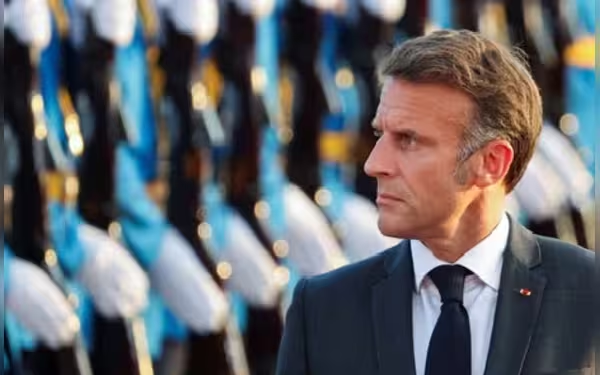Saturday, November 16, 2024 07:44 PM
France Elections: Macron Faces Rejection Amid Left-Wing Coalition Rise
- Macron's party loses majority in parliamentary elections.
- Left-wing coalition nominates Lucie Castets for prime minister.
- Macron dismisses collaboration with left, citing instability.
 Image Credits: thefrontierpost
Image Credits: thefrontierpostFrance's recent elections saw Macron's party lose majority, with a left-wing coalition emerging, raising questions about governance and democracy.
In a surprising turn of events, the political landscape in France has been shaken following the recent parliamentary elections. Emmanuel Macron, the current president, called for snap elections in June, a move that many believed would favor the far-right party led by Marine Le Pen. However, the outcome was unexpected, as a left-wing coalition emerged with the largest number of votes, although they lacked the majority needed to govern effectively.
The French constitution grants the president the power to appoint the prime minister, typically selecting someone from the majority party in the national assembly. Following the elections, the previous prime minister, Gabriel Attal, resigned after his centrist government was relegated to second place. Yet, Macron chose to keep the outgoing government in a caretaker role, citing the need for stability. This unprecedented situation has left France under the governance of ministers who have effectively resigned.
Many newly elected members of parliament owe their seats to a tactical voting strategy known as the "republican front," which aimed to prevent the far-right from gaining power. Despite this strategy benefiting Macron's party, he later ruled out collaboration with the left-wing party, La France Insoumise (LFI), labeling them as too radical. The left-wing coalition, known as the New Popular Front (NFP), eventually nominated Lucie Castets, a civil servant with a strong commitment to public services, as their prime ministerial candidate.
In response, Macron dismissed the left's proposal, stating that "nobody won" the election and that it would be incorrect to claim that the NFP held any majority. He then suggested an "Olympics truce," implying that a new government should wait until after the Olympic Games to be formed. This delay in consultations with political leaders raised eyebrows, as it took six weeks for Macron to engage with them after the election results.
When discussions concluded, Macron announced that he would not appoint a prime minister from the left, arguing that they would face a no-confidence vote without a majority in the national assembly. He proposed exploring a centrist coalition instead, a statement that many viewed as shocking and arrogant. Critics, including former president François Hollande, condemned this move as an "institutional mistake" and a power grab.
Macron's actions have sparked significant concern regarding the separation of powers and the integrity of democratic processes in France. The electorate clearly expressed their desire for change during the elections, and it is not the president's role to determine which political bloc is fit to govern. The current situation, with an outgoing government making major decisions, raises questions about the future of democracy in France.
As we navigate this unprecedented political climate, it is crucial for Macron to recognize the will of the people. His initial promise to disrupt the political system has now morphed into a scenario where he appears to be acting as an authoritarian leader. The French electorate has made their stance clear, and it is time for Macron to respect their wishes and work towards a government that reflects the diverse voices of the nation.













